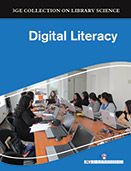Library Science

Technology delivers opportunities to contribute in new kinds of learning, social, community and work activities. We all need to be digitally literate to make the most of these opportunities. New technologies and developments in media are revolutionizing the way that individuals, groups and societies communicate, learn, work and administer. This new socio-technical reality needs participants to retain not only skills and abilities related to the use of technological tools, but also knowledge concerning the norms and practices of suitable usage.
To be ‘digitally literate’ in this way includes issues of cognitive authority, safety and privacy, creative, ethical, and liable use and reuse of digital media, among other topics. A shortage of digital literacy increasingly connects one's full potential of being a competent student, an empowered employee or an engaged citizen. Digital literacy is often considered a school-based competency, but it is introduced and developed in informal learning contexts such as libraries, museums, and social groups, affinity spaces online, not to mention the home environment.
This book entitled “Digital Literacy” recognizes and connects the ways we might conceptualize and realize an expanded view of digital literacy that fits today's changing reality. This book introduces a wide range of conceptual principles at the heart of multimedia composition and digital pedagogy.
The traditional view is to regard digital literacy as a set of specific technical skills such as the ability to use software and to operate devices this is often referred to as a skills model of literacy. In contrast, more recent and increasingly accepted theories conceive of digital literacy in terms of context and social practice this is a situated approach to literacy. Evidence has shown that while many young people feel self-reliant about using technology, this doesn’t always interpret into competence. This is mainly apparent in relation to ‘higher level’ critical thinking skills, e.g. awareness of commercial strategies or bias in the media. Assisting young people to make informed decisions about how and why they participate digitally is a significant response to the commercialization of childhood, to the need for e-safety and to children’s cumulative use of technology. Digital literacy is also vital for society and it can affect equivalence of access to information and services, employment, social inclusion and further learning prospects. In result, this can affect wider business productivity. This book offers a range of perspectives theories and experiences in order to create a common framework and is essential for educators and professionals in the technology fields.